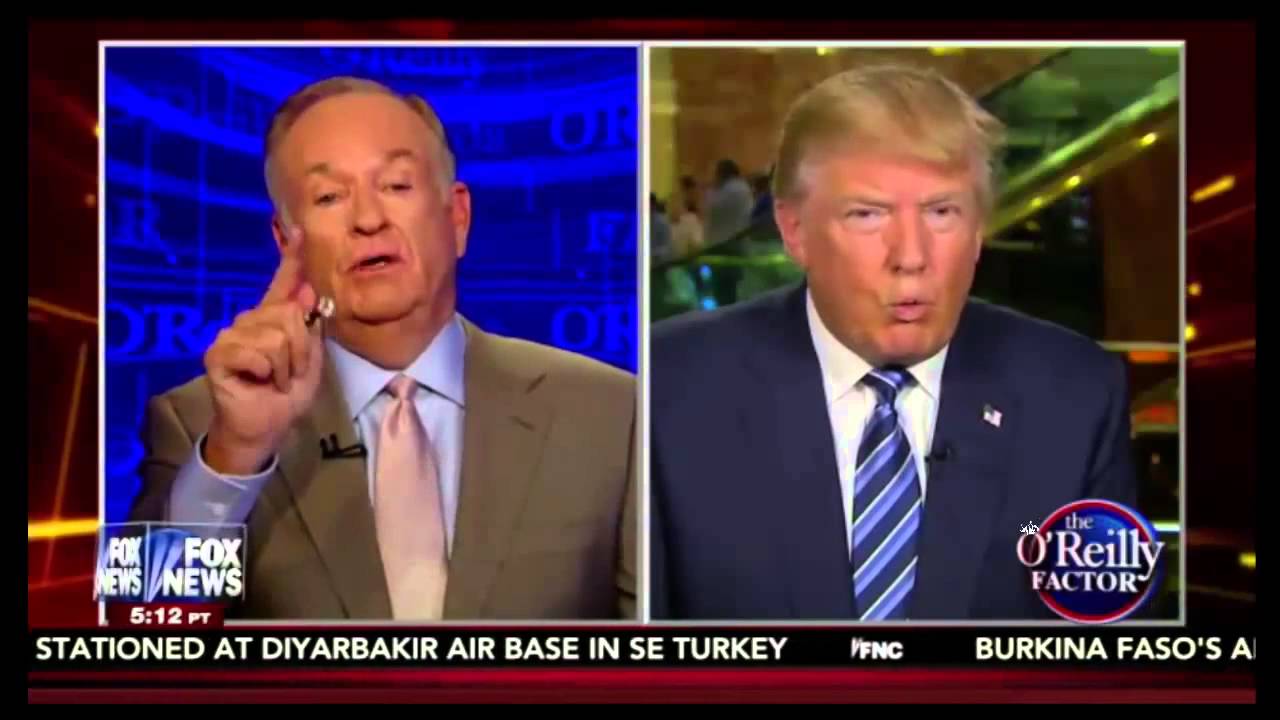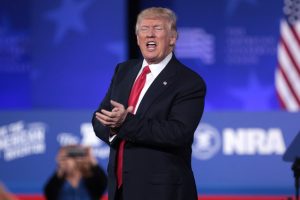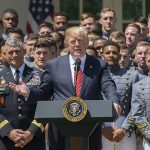by Robert E. Hunter
Whatever else happens this election year—and maybe the best and worst are yet to come—we can already conclude that the media has come fully into its own. The singular verb “is” is used advisedly, rather than the proper verb “are,” for a reason: that for purposes of presidential political campaigns, what has long been called “pack journalism” has become the rule, with few exceptions.
Why such a categorical judgment about the media’s role? Neither Donald Trump nor Bernie Sanders would be serious contenders for their respective party’s nominations without the media’s efforts to push them forward. (Bernie Sanders has not even been a Democrat except by convenience, but, hey, who cares?)
The media makes one basic calculation about its role in presidential politics: there has to be a horserace. Nothing is worse from this perspective than a “slam dunk” presidential nominating process, and there are two ways to achieve this goal. The first is to build someone up out of nowhere; and the second is to tear someone down (maybe the same candidate), again to create “interest,” which is “mother’s milk” to the media just as money is to politics. In the media’s case, it is, put generically, to “sell soap” and to show who’s the real boss in US political life.
Sorry, Mr. and Ms. Media, but like the proverbial baseball umpire, “I calls ‘em like I sees ‘em. “
The Influence of Money
“Mother’s milk” is an apt metaphor because the main use of money in politics, at least in national elections, is to buy media time, meaning radio and television and also cable. Presidential campaigns are expensive, a billion dollars and more per competitive campaign in the process from the first peep of a hatching candidacy until the roasters come out of the oven four years later on election day. Candidates and their staffs have to travel around the country. They have to set up headquarters and offices, design advertising campaigns, and then get out the vote. But by far the largest amount of the spending, dwarfing all others, is to purchase access to the airwaves and cable. The message may be positive and uplifting, or it may be down and dirty. But that is secondary to getting the attention of the voting public, one set of eyes and ears at a time.
How can this be true, you ask, when the airwaves really belong to the people? When Mssrs. Marconi and Dumont were just starting out, this might have been true. But the federal government auctioned off the airwaves long ago, often with little accruing to the US Treasury. Now the right to broadcast and telecast “belongs” to those who own the radio and TV stations, who will throttle anyone seeking to deny them a single nickel of revenue, which comes from paid advertising, not free political speech. Let us also not forget those who own cable and Internet connections: that maw also has to be fed money, and nothing comes free in this business. The idea of “public service broadcasting” went by the boards in practice long ago. The civics-friendly belief that candidates should be given free air time to spout their heads off or that politics should be at least partly educational died in the 1960s. Anyway, it would be boring and thus a threat to “ratings” just to see a candidate talk about issues important to the nation.
To be sure, lots of free time is made available to candidates for debates, seemingly every day, conducted by and altogether too much for the electronic media. But what do these debates tell us, the poor innocent voters? When TV was in its infancy, we learned that John Kennedy was better looking than Richard Nixon, who had a five o’clock shadow. Candidates learned the value of looking young and healthy (Hubert Humphrey had jowls and Walter Mondale had bags under his eyes, while Hollywood’s Ronald Reagan wore makeup every day of his political life). During these debates, candidates are well-advised not to wear glasses or take notes (Geraldine Ferraro should have known better), and they need to practice a snappy line or two: “There you go, again” (Reagan), “Where’s the beef?” (Mondale), or “You’re likeable enough, Hillary” (Obama).
As the number of debates has grown, along with their slickness, they have increasingly focused on a specialized celebrity culture, the media-employed interviewers, each with a mark to make in the industry, a desire for reflected glory that is real power in Washington, and loaded with “gotcha” questions rather than serious efforts to get candidates to express themselves, cogently and thoughtfully, on matters of moment to the country’s future.
Foreign policy is included, as though a debate can test the qualities of a prospective commander-in-chief. Yet it is simply not possible for anyone to know how he or she will make decisions about the conduct of the nation in the world until actually confronted with those challenges. But the candidates are forced to pretend otherwise. This can be dangerous, as this year the need is to be as hawkish as possible, with only Sanders among the remaining candidates steering as clear as he can. Kasich, Clinton, Trump, and Cruz, in ascending order of cacophony, are busy naming America’s enemies, which are seemingly everywhere. In this way, the candidates close off future choices for their sought-after presidency and commit themselves to muscular responses and uses of military power, but with almost no notion of what they would face in the Oval Office.
Besides which, a candidate’s ability to debate, qua debater, tell us virtually nothing about how he or she will do as president. Presidents need many skills, but the ability to debate in public isn’t one of them. Each week the British prime minister must appear in parliament to answer questions posed directly from a hostile opposition (and take abuse). The closest a US president comes to that kind of grilling is the White House press conference, where he (or she) controls who gets to ask a question and whether—if questioning gets too close to the mark—the offending journalist will be frozen out in future encounters with the president and might as well seek a new line of work.
Throughout a campaign, the biggest fear any candidate has is the unguarded comment or badly phrased statement, a problem magnified by the cell-phone video. The media pounces; the candidate dies. Joe Biden (1988) lifted a line from a British politician (as all politicians do, like Milton Berle in the joke business). Finis Joe. George Romney (1967) said that he had been brainwashed by the US military on a trip to Vietnam (he had been). Finis George. The media said that Edmund Muskie (1972) cried over comments about his wife in Concord, New Hampshire, while he said it was snow in his eyes. The media won, and finis Muskie.
Gaming the System
Smart and dedicated politicians can temper this tyranny of money and the media. Hillary Clinton was straight out of the chute early in this election cycle, lining up a lot of the big contributors needed to fund her huge media bill and scaring off most serious competitors: she “gamed the system.” But fair enough. Other Democrats could have pursued the same course but didn’t. Bernie Sanders faced a similar problem of access to the media and through it to the American people. He took a page out of Barack Obama’s 2008 playbook by focusing on the social media and getting lots of little contributions with his appeal to a younger audience that wants a different kind of politics (and country). But without the media deciding to cast him as Jack the Giant Killer, this technique was unlikely to have got him anywhere nearly as close to where he is now. (In 1984, the media anointed Gary Hart to play a similar role as challenger to the Democrats’ “sure thing,” Walter Mondale).
In the Republican Party, Donald Trump took his own approach to gaming the system by letting the media do his work for him. He did not have to try raising lots of money from the party establishment (a role best played by the now-forgotten Jeb Bush). By being outrageous, Trump has gotten as much free media exposure as he can handle and is still leading the pack. But what if media interest begins to flag? He knows all he has to do is say something else outrageous, thus guaranteeing at least another 48 hours of dominance in the media, which falls for this trick every time. The subject and content of what he says hardly matters, however idiotic or contemptuous of parts of the electorate who probably wouldn’t vote for him anyway. The media gains ratings as Trump plays it for a sucker.
Most bemusing, if it weren’t so serious and potentially tragic, is that the media is now shouting that it had nothing to do with Trump’s rise. Sorry, Dr. Frankenstein, that monster can be traced straight back to your laboratory (and remember, Mary Shelly wrote the original precisely to warn about risks of what we now call technology.)
I must not blame everything on the media. Both Sanders and Trump have struck a nerve, or rather several of them. One nerve is mostly on the left, the other mostly on the right. But they have common features and have hit upon some real problems. These include no more “stupid stuff” abroad (Barack Obama’s patented line); rebuilding America; cutting down those who Teddy Roosevelt called the “malefactors of great wealth;” reducing the squeeze on the middle class in a time of plenty; and looking out for the little guy and gal (though Sanders and Trump don’t necessarily have the same people in mind). This doesn’t mean that Hillary Clinton has nothing important to say, lacks appeal, or isn’t as likely as anyone else to be as good a president as is currently possible. Maybe so. But head never sold over heart in campaign sloganeering, certainly for the media, even if the voters decide differently on November 8.
Further, the two parties are in different situations. The Democrats still have two credible candidates. But on the Republican side, the Joker still leads the pack, while almost all the reasonable choices have fallen overboard, with Governor John Kasich barely holding on to a life raft. Is Senator Ted Cruz a viable alternative to Trump to be a serious president? Give me (and the country) a break!
Don’t get me wrong. The media did not gain its preeminence in American political life all by itself. It was, perhaps “only doing its job,” acting, as a former journalist and senior White House staffer, Douglass Cater, called it, the “fourth branch of government.” Indeed, for good reason the media is the only branch not subject to checks and balances, as the sine qua non of a free society. “The only security of all is in a free press,” Thomas Jefferson declared. But too many members of the Fourth Estate have lost virtually all sense of self-control and responsibility to the nation, notably regarding indulgence and promotion for so long of a demagogue, Donald Trump, who has stolen the media’s clothes.
Beyond PR
When a presidential campaign becomes less about political process, the brokering of interests, and the building of coalitions, and more about a media-dominated show, what chance for governance is there? The national party conventions are no longer places where different interest groups struggle to develop at least a bit of coherence on reconciling differences between various perspectives and parts of the country. They are now just about public relations, which—no surprise—the electronic media rightly sees for the boring business they have become and no longer provides gavel-to-gavel coverage.
It is no wonder that the last several presidents have found that they can only get a small fraction of the nation’s business done, no matter how large a majority of the popular vote they have gained and even if their party controls one or both houses of Congress.
Alas, it can be confidently predicted that whoever becomes president next January 20th, he or she will be no more likely than recent predecessors in this age of the Toothless Party and Media Ascendency to be able to govern as the nation’s overall interests require. (This prediction does not even take into account other critical impediments: gerrymandering of the House of Representatives that has robbed its elections of most of their representative nature; a dysfunctional Supreme Court that has opened the political money taps to corporations, unions, and the very wealthy; and assaults on the 1965 Voting Rights Act that are reducing the rolls of Americans able to vote).
Will we as a nation survive this year? We have in the past and can hope for the future. Otto von Bismarck supposedly said that “God looks after fools, drunks, and the United States.” But we need to do better, we can do better, and we had better learn to do better. That applies double to the media. Our future depends on it.






“Neither Donald Trump nor Bernie Sanders would be serious contenders for their respective party’s nominations without the media’s efforts to push them forward.”
Oh I don’t know about that. Every time I turn on the TV or see a facebook feed these days I see talking heads engaged in Trump bashing which usually goes like these lines:
a) Trump is a horrible person;
b) the people who vote for him are horrible people;
c) if you are thinking about voting for Trump then you must be a horrible person too; and
d) you should follow our advice, stick to the script, and not vote for Trump because we know what’s best for the country and you don’t.
What’s Trump spent on ads? Last time I checked it was $10 million, a fraction of what the rest of them are spending. Nobody seems to be listening to the media self-appointed moral authorities.
Can the same be said about Bernie? Maybe. Some think Bernie was thrown into the ring as a sparring partner for Hilary, to get her primed up for the main event in November. What nobody counted on is how deeply disliked Hilary is among Democrats. And besides, wasn’t she president already? Wasn’t she pulling the strings behind Bill in the 1990’s? Eight years of Clintons is enough.
I’m sorry – if you are going to express an opinion at least base it on facts. Bernie Sanders has NOT been pushed by the media. His success has been almost entirely though the internet. If he HAD been pushed by the media Hillary Clinton would be but a distant memory. And if you don’t understand the deep groundswell of anger against both Democratic and Republican leadership then you have been living in a hole in the ground. Trump is leading BECAUSEof the media (you got that right anyway) – Sanders has done so well DESPITE the media. So – if you are going to pontificate – at least get it right.
But you sure as heck got it correct about the media not doing their job – well spoken,
Beautifully written.